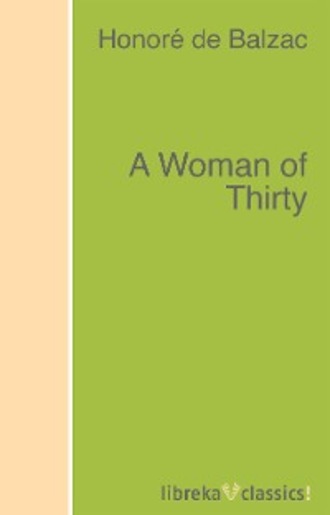
Полная версия
A Woman of Thirty
And he the centre of such love, such enthusiasm and devotion, and so many prayers, he for whom the sun had driven the clouds from the sky, was sitting there on his horse, three paces in front of his Golden Squadron, with the grand Marshal on his left, and the Marshal-in-waiting on his right. Amid all the outburst of enthusiasm at his presence not a feature of his face appeared to alter.
"Oh! yes. At Wagram, in the thick of the firing, on the field of Borodino, among the dead, always as cool as a cucumber he is!" said the grenadier, in answer to the questions with which the young girl plied him. For a moment Julie was absorbed in the contemplation of that face, so quiet in the security of conscious power. The Emperor noticed Mlle. de Chatillonest, and leaned to make some brief remark to Duroc, which drew a smile from the Grand Marshal. Then the review began.
If hitherto the young lady's attention had been divided between Napoleon's impassive face and the blue, red, and green ranks of troops, from this time forth she was wholly intent upon a young officer moving among the lines as they performed their swift symmetrical evolutions. She watched him gallop with tireless activity to and from the group where the plainly dressed Napoleon shone conspicuous. The officer rode a splendid black horse. His handsome sky-blue uniform marked him out amid the variegated multitude as one of the Emperor's orderly staff-officers. His gold lace glittered in the sunshine which lighted up the aigrette on his tall, narrow shako, so that the gazer might have compared him to a will-o'-the-wisp, or to a visible spirit emanating from the Emperor to infuse movement into those battalions whose swaying bayonets flashed into flames; for, at a mere glance from his eyes, they broke and gathered again, surging to and fro like the waves in a bay, or again swept before him like the long ridges of high-crested wave which the vexed Ocean directs against the shore.
When the manoeuvres were over the officer galloped back at full speed, pulled up his horse, and awaited orders. He was not ten paces from Julie as he stood before the Emperor, much as General Rapp stands in Gerard's Battle of Austerlitz. The young girl could behold her lover in all his soldierly splendor.
Colonel Victor d'Aiglemont, barely thirty years of age, was tall, slender, and well made. His well-proportioned figure never showed to better advantage than now as he exerted his strength to hold in the restive animal, whose back seemed to curve gracefully to the rider's weight. His brown masculine face possessed the indefinable charm of perfectly regular features combined with youth. The fiery eyes under the broad forehead, shaded by thick eyebrows and long lashes, looked like white ovals bordered by an outline of black. His nose had the delicate curve of an eagle's beak; the sinuous lines of the inevitable black moustache enhanced the crimson of the lips. The brown and tawny shades which overspread the wide high-colored cheeks told a tale of unusual vigor, and his whole face bore the impress of dashing courage. He was the very model which French artists seek to-day for the typical hero of Imperial France. The horse which he rode was covered with sweat, the animal's quivering head denoted the last degree of restiveness; his hind hoofs were set down wide apart and exactly in a line, he shook his long thick tail to the wind; in his fidelity to his master he seemed to be a visible presentment of that master's devotion to the Emperor.
Julie saw her lover watching intently for the Emperor's glances, and felt a momentary pang of jealousy, for as yet he had not given her a look. Suddenly at a word from his sovereign Victor gripped his horse's flanks and set out at a gallop, but the animal took fright at a shadow cast by a post, shied, backed, and reared up so suddenly that his rider was all but thrown off. Julie cried out, her face grew white, people looked at her curiously, but she saw no one, her eyes were fixed upon the too mettlesome beast. The officer gave the horse a sharp admonitory cut with the whip, and galloped off with Napoleon's order.
Julie was so absorbed, so dizzy with sights and sounds, that unconsciously she clung to her father's arm so tightly that he could read her thoughts by the varying pressure of her fingers. When Victor was all but flung out of the saddle, she clutched her father with a convulsive grip as if she herself were in danger of falling, and the old man looked at his daughter's tell-tale face with dark and painful anxiety. Pity, jealousy, something even of regret stole across every drawn and wrinkled line of mouth and brow. When he saw the unwonted light in Julie's eyes, when that cry broke from her, when the convulsive grasp of her fingers drew away the veil and put him in possession of her secret, then with that revelation of her love there came surely some swift revelation of the future. Mournful forebodings could be read in his own face.
Julie's soul seemed at that moment to have passed into the officer's being. A torturing thought more cruel than any previous dread contracted the old man's painworn features, as he saw the glance of understanding that passed between the soldier and Julie. The girl's eyes were wet, her cheeks glowed with unwonted color. Her father turned abruptly and led her away into the Garden of the Tuileries.
"Why, father," she cried, "there are still the regiments in the Place du Carrousel to be passed in review."
"No, child, all the troops are marching out."
"I think you are mistaken, father; M. d'Aiglemont surely told them to advance——"
"But I feel ill, my child, and I do not care to stay."
Julie could readily believe the words when she glanced at his face; he looked quite worn out by his fatherly anxieties.
"Are you feeling very ill?" she asked indifferently, her mind was so full of other thoughts.
"Every day is a reprieve for me, is it not?" returned her father.
"Now do you mean to make me miserable again by talking about your death? I was in such spirits! Do pray get rid of those horrid gloomy ideas of yours."
The father heaved a sigh. "Ah! spoiled child," he cried, "the best hearts are sometimes very cruel. We devote our whole lives to you, you are our one thought, we plan for your welfare, sacrifice our tastes to your whims, idolize you, give the very blood in our veins for you, and all this is nothing, is it? Alas! yes, you take it all as a matter of course. If we would always have your smiles and your disdainful love, we should need the power of God in heaven. Then comes another, a lover, a husband, and steals away your heart."
Julie looked in amazement at her father; he walked slowly along, and there was no light in the eyes which he turned upon her.
"You hide yourself even from us," he continued, "but, perhaps, also you hide yourself from yourself—"
"What do you mean by that, father?"
"I think that you have secrets from me, Julie.—You love," he went on quickly, as he saw the color rise to her face. "Oh! I hoped that you would stay with your old father until he died. I hoped to keep you with me, still radiant and happy, to admire you as you were but so lately. So long as I knew nothing of your future I could believe in a happy lot for you; but now I cannot possibly take away with me a hope of happiness for your life, for you love the colonel even more than the cousin. I can no longer doubt it."
"And why should I be forbidden to love him?" asked Julie, with lively curiosity in her face.
"Ah, my Julie, you would not understand me," sighed the father.
"Tell me, all the same," said Julie, with an involuntary petulant gesture.
"Very well, child, listen to me. Girls are apt to imagine noble and enchanting and totally imaginary figures in their own minds; they have fanciful extravagant ideas about men, and sentiment, and life; and then they innocently endow somebody or other with all the perfections of their day-dreams, and put their trust in him. They fall in love with this imaginary creature in the man of their choice; and then, when it is too late to escape from their fate, behold their first idol, the illusion made fair with their fancies, turns to an odious skeleton. Julie, I would rather have you fall in love with an old man than with the Colonel. Ah! if you could but see things from the standpoint of ten years hence, you would admit that my old experience was right. I know what Victor is, that gaiety of his is simply animal spirits—the gaiety of the barracks. He has no ability, and he is a spendthrift. He is one of those men whom Heaven created to eat and digest four meals a day, to sleep, to fall in love with the first woman that comes to hand, and to fight. He does not understand life. His kind heart, for he has a kind heart, will perhaps lead him to give his purse to a sufferer or to a comrade; but he is careless, he has not the delicacy of heart which makes us slaves to a woman's happiness, he is ignorant, he is selfish. There are plenty of buts—"
"But, father, he must surely be clever, he must have ability, or he would not be a colonel—"
"My dear, Victor will be a colonel all his life.—I have seen no one who appears to me to be worthy of you," the old father added, with a kind of enthusiasm.
He paused an instant, looked at his daughter, and added, "Why, my poor Julie, you are still too young, too fragile, too delicate for the cares and rubs of married life. D'Aiglemont's relations have spoiled him, just as your mother and I have spoiled you. What hope is there that you two could agree, with two imperious wills diametrically opposed to each other? You will be either the tyrant or the victim, and either alternative means, for a wife, an equal sum of misfortune. But you are modest and sweet-natured, you would yield from the first. In short," he added, in a quivering voice, "there is a grace of feeling in you which would never be valued, and then——" he broke off, for the tears overcame him.
"Victor will give you pain through all the girlish qualities of your young nature," he went on, after a pause. "I know what soldiers are, my Julie; I have been in the army. In a man of that kind, love very seldom gets the better of old habits, due partly to the miseries amid which soldiers live, partly to the risks they run in a life of adventure."
"Then you mean to cross my inclinations, do you, father?" asked Julie, half in earnest, half in jest. "Am I to marry to please you and not to please myself?"
"To please me!" cried her father, with a start of surprise. "To please me, child? when you will not hear the voice that upbraids you so tenderly very much longer! But I have always heard children impute personal motives for the sacrifices that their parents make for them. Marry Victor, my Julie! Some day you will bitterly deplore his ineptitude, his thriftless ways, his selfishness, his lack of delicacy, his inability to understand love, and countless troubles arising through him. Then, remember, that here under these trees your old father's prophetic voice sounded in your ears in vain."
He said no more; he had detected a rebellious shake of the head on his daughter's part. Both made several paces towards the carriage which was waiting for them at the grating. During that interval of silence, the young girl stole a glance at her father's face, and little by little her sullen brow cleared. The intense pain visible on his bowed forehead made a lively impression upon her.
"Father," she began in gentle tremulous tones, "I promise to say no more about Victor until you have overcome your prejudices against him."
The old man looked at her in amazement. Two tears which filled his eyes overflowed down his withered cheeks. He could not take Julie in his arms in that crowded place; but he pressed her hand tenderly. A few minutes later when they had taken their places in the cabriolet, all the anxious thought which had gathered about his brow had completely disappeared. Julie's pensive attitude gave him far less concern than the innocent joy which had betrayed her secret during the review.
Nearly a year had passed since the Emperor's last review. In early March 1814 a caleche was rolling along the highroad from Amboise to Tours. As the carriage came out from beneath the green-roofed aisle of walnut trees by the post-house of la Frilliere, the horses dashed forward with such speed that in a moment they gained the bridge built across the Cise at the point of its confluence with the Loire. There, however, they come to a sudden stand. One of the traces had given way in consequence of the furious pace at which the post-boy, obedient to his orders, had urged on four horses, the most vigorous of their breed. Chance, therefore, gave the two recently awakened occupants of the carriage an opportunity of seeing one of the most lovely landscapes along the enchanting banks of the Loire, and that at their full leisure.
At a glance the travelers could see to the right the whole winding course of the Cise meandering like a silver snake among the meadows, where the grass had taken the deep, bright green of early spring. To the left lay the Loire in all its glory. A chill morning breeze, ruffling the surface of the stately river, had fretted the broad sheets of water far and wide into a network of ripples, which caught the gleams of the sun, so that the green islets here and there in its course shone like gems set in a gold necklace. On the opposite bank the fair rich meadows of Touraine stretched away as far as the eye could see; the low hills of the Cher, the only limits to the view, lay on the far horizon, a luminous line against the clear blue sky. Tours itself, framed by the trees on the islands in a setting of spring leaves, seemed to rise like Venice out of the waters, and her old cathedral towers soaring in air were blended with the pale fantastic cloud shapes in the sky.









